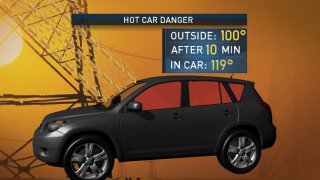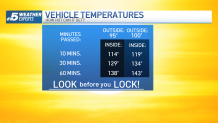
On Wednesday, the Federal Communications Commission granted six waiver requests from manufactures and automakers to allow in-car radars that could alert a driver if a child is accidentally left unattended in a car.
This new technology will be used to monitor children left in hot cars and trigger alerts that could lead to saving their lives.
"Technology is providing new ways for families to help keep their children safe," said FCC.
Acting Chairwoman Jessica Rosenworcel said, "That's why I'm proud that the FCC can play a role in protecting kids from the avoidable danger of deadly heatstroke. With summer fast approaching, these waivers are a first step toward implementing a more permanent policy framework for promoting innovations like these life-saving auto safety technologies."
Get DFW local news, weather forecasts and entertainment stories to your inbox. Sign up for NBC DFW newsletters.
According to the National Highway Traffic Safety Administration, children dying from heatstroke in hot cars has increased over recent years with 52 and 53 such deaths in 2019 and 2018. The majority of these deaths are due to someone forgetting a child in the car.
The FCC formally granted the wavier requests of Brose North America, IEE Sensing, Infineon Technologies Americas, Tesla, Valeo North America and Vayyar Imaging. This action grants limited waivers of the agency's Section 15.255 technical and service rules for unlicensed operation in the 57-71 GHz band.
Janette Fennell, President of KidsAndCars.org believes this a move in the right direction to implement this technology in cars to save the lives of children.
Tech News
"Over 990 children have died in hot cars since 1990," states Janette Fennell, President of KidsAndCars.org. "The inexpensive technology granted waivers today by the FCC is the detection feature necessary to address both children unknowingly left alone in vehicles as well as those who get into vehicles on their own. Our vehicles are already filled with so many reminders, yet this addition may be the latest, best life-saving feature for our precious young children," she continued.
Cathy Chase, President of Advocates for Highway and Auto Safety, said, "Advocates for Highway and Auto Safety commends Federal Communications Commission (FCC) Acting Chairwoman Jessica Rosenworcel and the FCC's Office of Engineering and Technology for granting waiver requests from equipment manufacturers and automakers to use proven technology to stop preventable and perilous 'hot car' deaths caused by children unknowingly left in or independently entering otherwise unoccupied cars."
Chase believes it will have to become the new normal for this to actually make a difference and be installed in all cars.
Public education and voluntary industry agreements have not and will not overcome this serious risk. The critical next step is for Congress to require vehicles to be equipped with these detection and alert systems so that drivers and caregivers are reminded of the presence of a child in the back seat. This technology will save the lives of some of our most vulnerable passengers.
Miles Harrison, a father who after his own experience of losing his son has been working tirelessly to help prevent these unthinkable hot car deaths, said, "Changes in routine, stress, sleep deprivation, and other factors can predispose one's brain to go on 'autopilot' and a parent or caregiver can lose awareness of a child in the back seat of a car. I am so very thankful that the FCC has granted waivers to allow the use of available and affordable technology to help end these predictable and preventable tragedies."
HOT CAR SAFETY
According to the National Safety Council, if it's 95 degrees outside the internal temperature of a car could climb to 129 degrees in 30 minutes. After just 10 minutes, temperatures inside could reach 114 degrees.
A child's body temperature heats up three to five times faster than an adult and heatstroke can begin when a person's core body temperature reaches 104 degrees. A core temperature of 107 degrees is lethal, according to the Texas Department of State Health Services.




